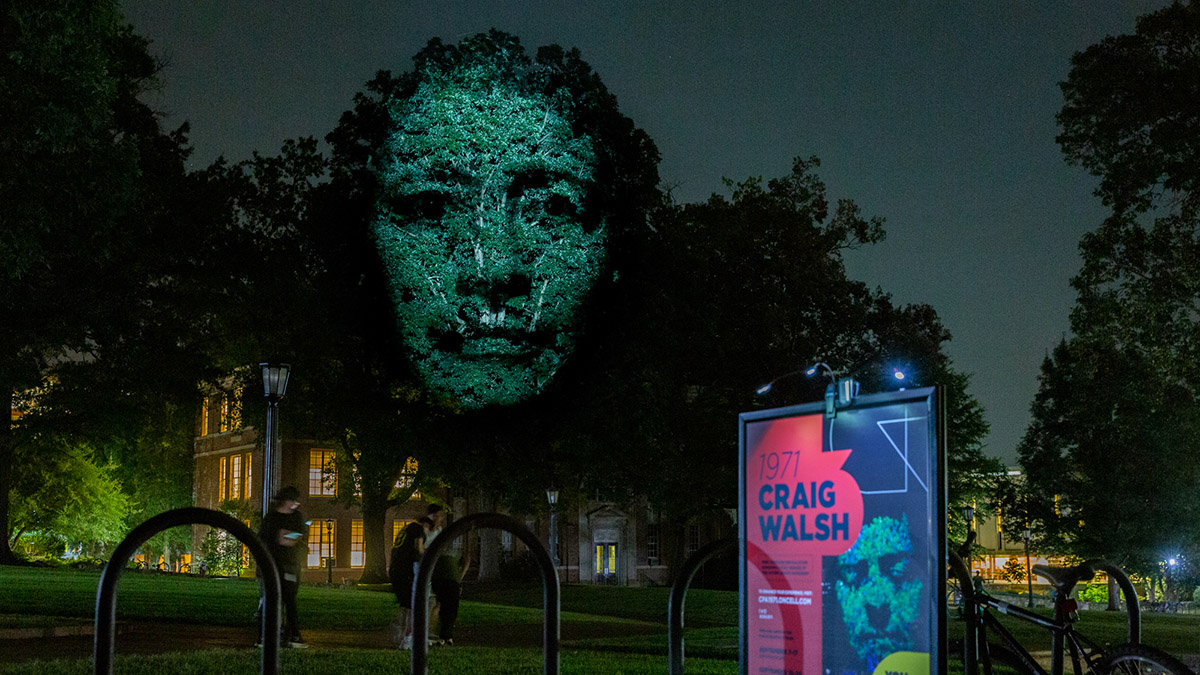Carolina celebrates unsung heroes of voting rights through art
Carolina Performing Arts' newest art installation pays homage to three women who have dedicated their lives to advancing voting rights in North Carolina.

If you wander through Polk Place at night this week, you’ll find a captivating new art installation among the trees.
You might not recognize the women whose video portraits are projected onto the trees surrounding the quad, but that’s kind of the point. In its inaugural outdoor art installation, Carolina Performing Arts pays homage to three unsung heroes — or sheroes, rather — who have dedicated their lives to the women’s suffrage movement in North Carolina.
The installation’s name, “1971,” refers to the year the 19th Amendment was ratified in North Carolina, more than 50 years after Congress granted women the right to vote.
The installation is the first at an American university by Australian artist Craig Walsh, whose work appears in public spaces all over the world to celebrate unsung heroes who have made significant contributions to their communities.
It is part of a wider effort by CPA to honor the creative leadership of women this season, which will include a performance from a four-woman dance group, a saxophonist’s tribute to Frida Kahlo, and a chamber opera featuring two voices sharing the part of one transgender protagonist.
Amy Russell, the director of programming for CPA, said she hopes the “1971” installation will encourage spectators to take a closer look at the 19th Amendment.
“I hope people will ask themselves, ‘What did the amendment accomplish, what work did it leave undone, and where is that work being done today in my own community?’” Russell said. “These are just everyday women who have chosen to dedicate their lives to the expansion of voting rights in North Carolina without any credit or accolades, so they really are unsung heroes who deserve to be recognized, and who symbolize so many others like themselves.”
The installation honors Mae McLendon, Mary Jones Phillips and Diane Robertson, each of whom have played a vital role in advancing women’s rights, increasing voter participation and advocating for social justice reform in Chapel Hill and Carrboro.
The honorees were chosen by a curatorial panel that includes Gloria Thomas of the Carolina Women’s Center and Jennifer Standish of the Southern Oral History Program. The curators were supported by Molly Luby and Susan Brown of the Chapel Hill Public Library and Danita Mason-Hogans from the Center for Documentary Studies at Duke.
In addition to their portraits, which fade into view as the day turns to night and are visible until 11 p.m., McLendon, Phillips and Robertson sat down with Carolina’s Southern Oral History Program to record their stories and memories from their years of activism.
“To me, my vote is my power — what little bit I had,” McClendon shares in her oral history. “That’s something that’s mine, and I won’t let anybody take it away from me.”
The installation will be on display at Polk Place until Sept. 17 and will move to the Chapel Hill Public Library on Sept. 19. The exhibition will end Sept. 29.
“We really want to get outside of the walls of our theaters to reach a broader audience and meet people where they live,” Russell said. “I hope that they are surprised and delighted by encountering really stunning visual art and incredible local stories just on their walk or while going to the library.”




